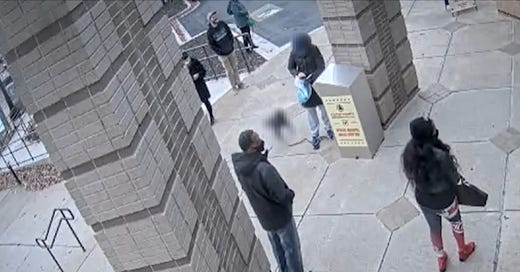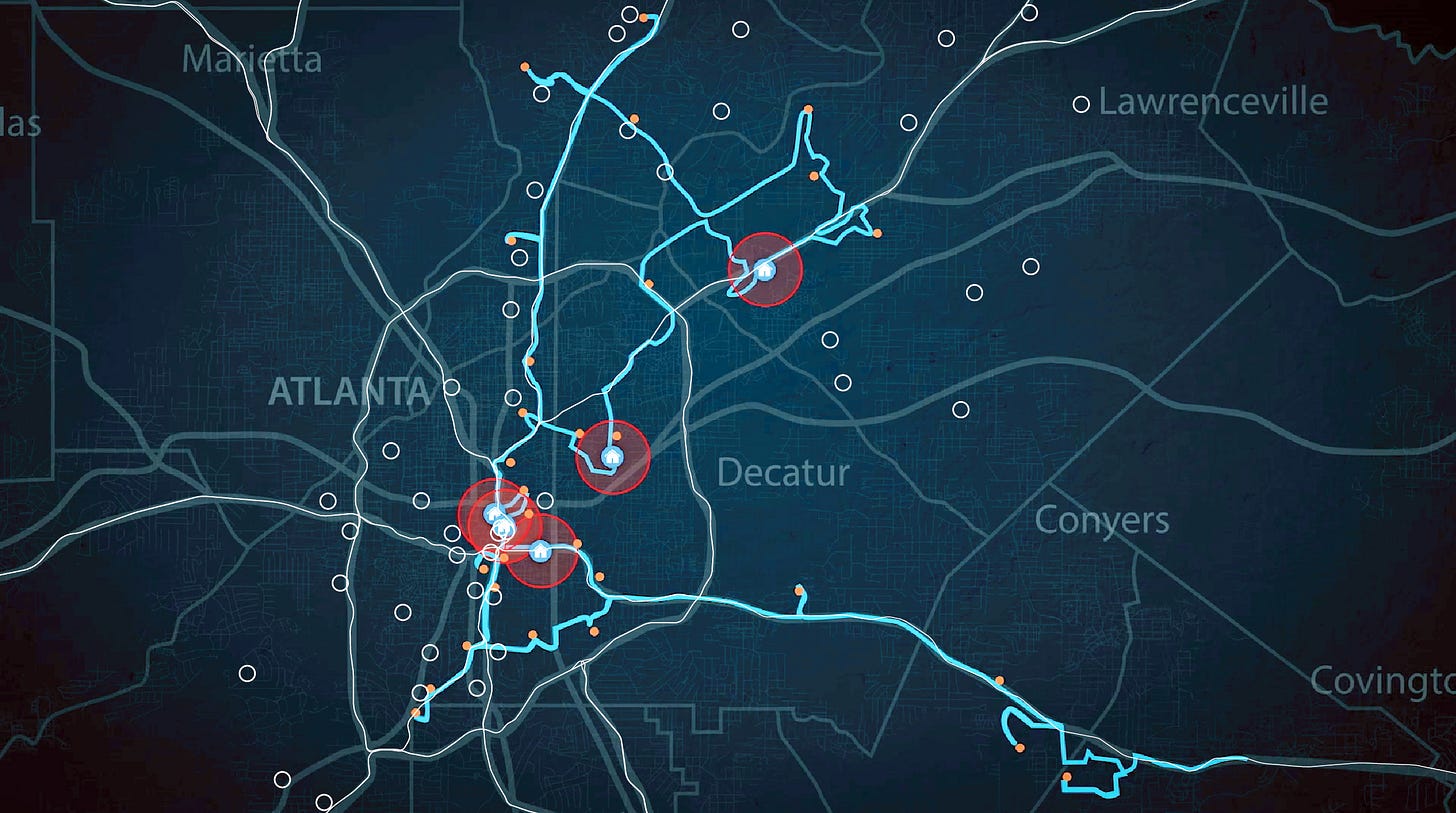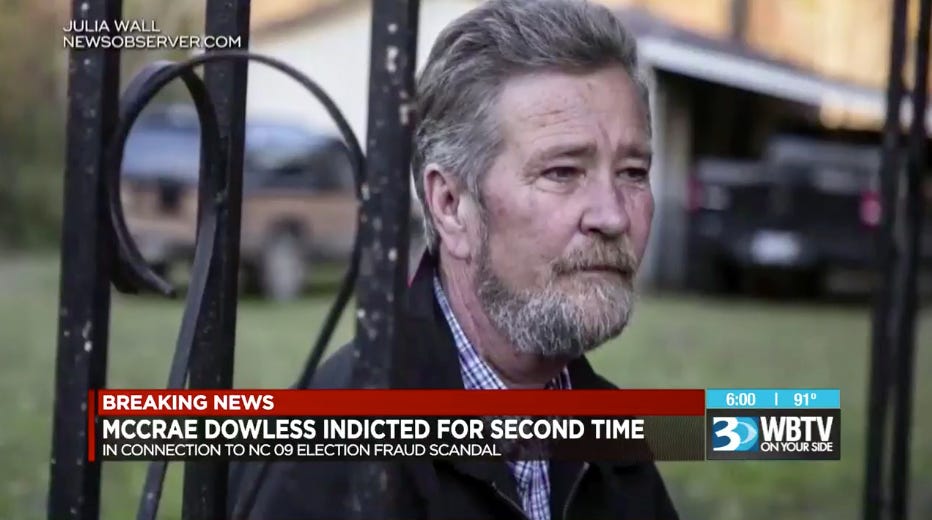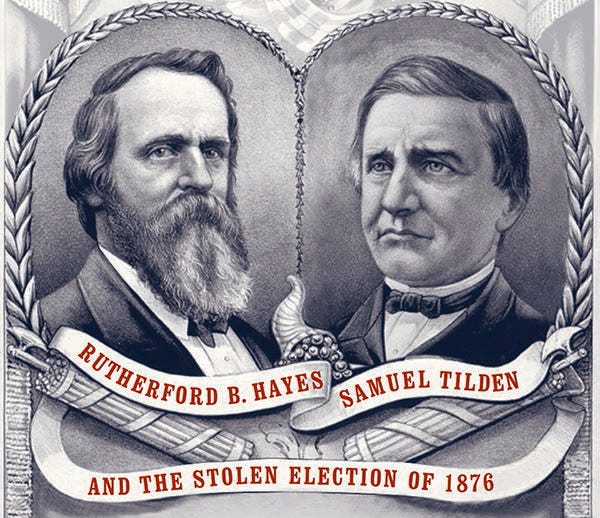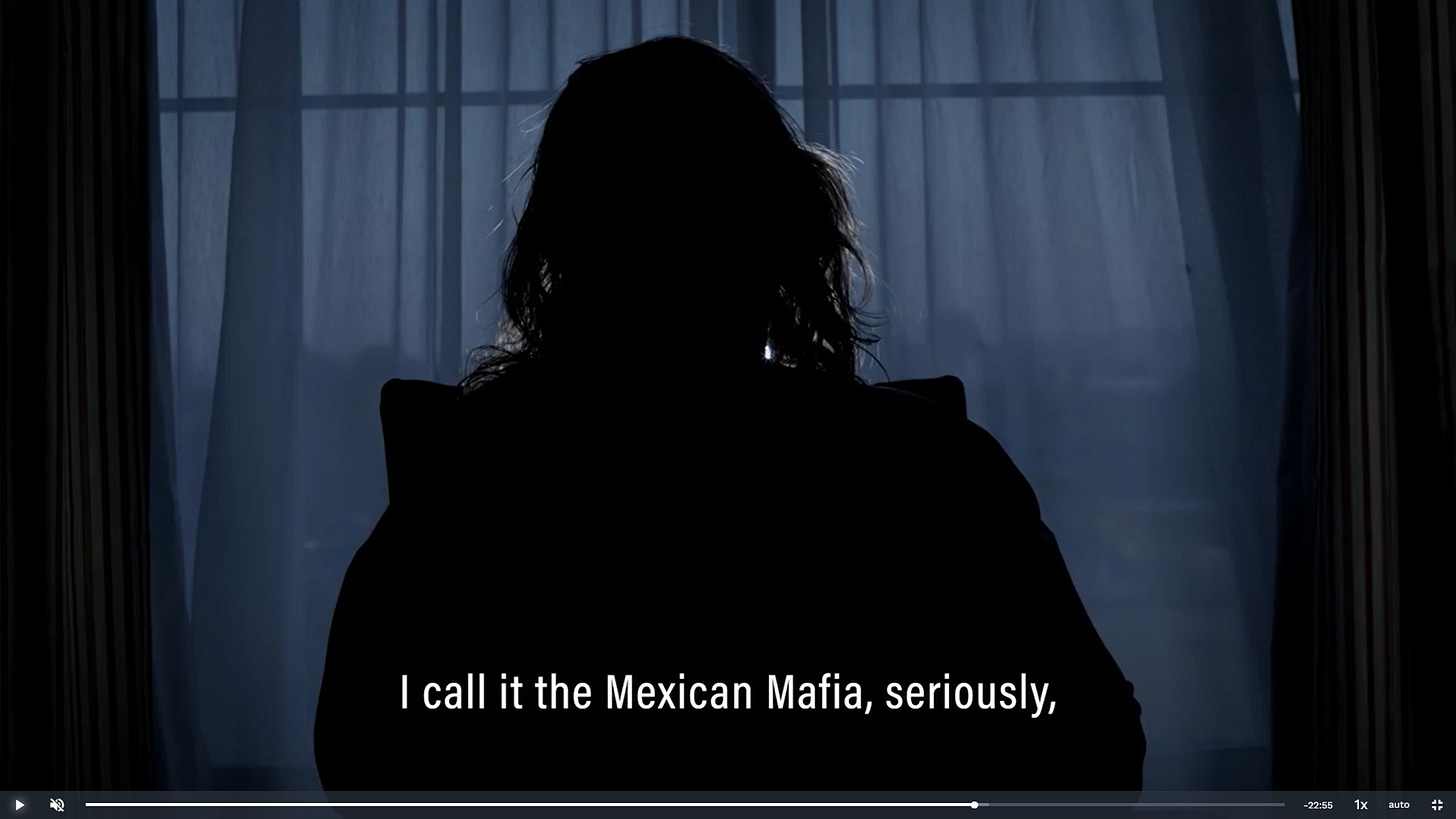It was in broad daylight. While a crowd of people queued up to enter a polling place, a man with a dog walked up to an outside ballot-collection box and started stuffing envelopes into it from a blue backpack.
No security guard confronted the ballot box-stuffer. No poll watcher or county election official called 911. No one seemed to think this was illegal behavior – a felony in progress – except Dinesh D’Souza and his crew producing the new voter-fraud exposé, 2000 Mules.
“Never in U.S. history has a presidential election been as thoroughly corrupted by coordinated fraud across multiple states as we now know took place in 2020,” D’Souza says, reasoned and matter-of-fact. “Without free and fair elections, we are not a democracy.”
2000 Mules showcases research by True the Vote, an election-integrity nonprofit run by Texas Tea Party activist Catherine Engelbrecht. She and Gregg Phillips (former head of the Mississippi Department of Human Services) provided D’Souza two types of circumstantial evidence they say proves the 2020 election was stolen: geotracking from some 10 trillion cell phone pings, and surveillance video from county election offices.
By cross-referencing cell phone geo-location data (which is apparently collected by cell phone applications and sold to advertisers) of ballot drop-boxes and unnamed Democratic political organizations, Engelbrecht and Phillips paint a convincing picture that people were paid to deliver ballots to dropboxes – which they claim is illegal.
True the Vote creates “pattern of life” maps of ballot trafficking mules using cell phone ping data.
This is not about tampered voting machines or the popular election-theft scenario in which Democratic states halted vote-counting on election night to create last-minute fraudulent votes to reverse Trump’s lead. 2000 Mules suggests a slow-but-sure ballot dropbox-stuffing operation that took at least a month to pull off.
“This was an organized effort to subvert a free and fair election,” Phillips says. “This is organized crime. You can’t look at this data in its aggregate and believe anything else.”
D’Souza’s fair-minded persona is a refreshing departure from fist-pounders like Dan Bongino or Alex Jones. Dennis Prager, fabled Jewish-conservative author and radio talk show host, plays the role of “agnostic” on D’Souza’s sounding-board group from Salem Media. He’s not convinced True the Vote has connected the dots.
“I am awaiting more information. Show me the proof,” Prager tells the group. “I have not gone on board with ‘I know for a fact this was a fraud.’”
I’m with Prager. D’Souza needs to answer a couple foundational questions: 1) Is “ballot harvesting” illegal or just standard Get-Out-the-Vote strategy, and 2) If these so-called mules are delivering ballots illegally, why hasn’t law enforcement responded to the evidence?
Ballot harvesting or trafficking?
Make no mistake, people commit election fraud and are even convicted. Each state has its own mix of regulations regarding voter registration and the proper casting of ballots.
As a case in point, 2000 Mules mentions the 2019 indictment of Leslie McCrae Dowless for mishandling absentee ballots in North Carolina. Charges that Dowless paid workers to collect absentee ballots from voters, fraudulently sign and deliver them to election offices eventually led to a replacement special election in a congressional race.
Ballot collection by third parties is illegal in North Carolina, but Dowless died of lung cancer before he could go to trial. The film doesn’t mention that Dowless was a Republican operative in the campaign of Republican pastor Mark Harris.
D’Souza states that delivering a ballot to a dropbox for someone else is actually legal in 27 states – the depositor just can’t get paid for doing it. Engelbrecht also makes it clear she’s not saying the ballots are phony. Both she and D’Souza say ballots just can’t be delivered by paid third parties.
According to Ballotpedia, “ballot harvesting” is a common Get-Out-the-Vote strategy in most states:
• 25 states and D.C. allow someone chosen by the voter to return a ballot
• 13 states have no laws at all about returning ballots on behalf of voters
• 11 states do restrict who may return ballots on behalf of voters
• Only Alabama specifies that the voter alone may return the mail ballot
D’Souza, Engelbrecht and Phillips focus on possible harvesting illegalities in Georgia, Arizona, Wisconsin, Michigan and Pennsylvania – states where the race was neck-and-neck and Trump was expected to win.
They concede that Biden’s wins in Wisconsin and Michigan would not be reversed by vote trafficking, but estimate there were enough illegally trafficked votes in Georgia, Arizona and Pennsylvania to give the election to Trump.
Ballot harvesting is clearly legal in Pennsylvania. Georgia and Arizona indeed have restrictions, so we’re down to two states to overturn the election.
In Georgia, absentee ballots can only be returned by family members, housemates or – if the voter is physically disabled – a caregiver. Arizona laws are similar. None of the laws mention being paid to assist as a factor.
Debating D’Souza’s use of geotracking data to identify mules is irrelevant here – his video evidence clearly indicates people were dropping off multiple ballots. If that happened in Georgia or Arizona, we’re looking at real felonies.
The problem is – and this is a hole D’Souza can drive 2,000 mules through – he didn’t interview any election officials, ballot mules or nonprofit organizations he claims collected the ballots for the mules to drop.
Show me the mules.
Fraud police
Voter fraud, election violence and voter suppression have plagued the United States since the beginning. Elections are decentralized to the state level – which means there is no easy way to either hack the whole election at one time, or to police it.
By the fourth presidential election in 1800, two-party bickering had become a driving force. There was no popular vote – state legislatures picked an Electoral College to do the deed, a compromise between Framers who wanted Congress to choose the president and those who preferred a national popular vote.
Federalist candidates John Adams and Charles Pinckney of South Carolina faced Democratic-Republicans Thomas Jefferson and former New York Senator Aaron Burr. The electors were maneuvered into a tie, so the decision went to the House of Representatives, who voted without decisive outcome for three days.
“A shaken President Adams was certain the two sides had come to the ‘precipice’ of disaster and that ‘a civil war was expected,’” according to Smithsonian magazine. “There was talk that Virginia would secede if Jefferson were not elected. It was rumored that a mob had stormed the arsenal in Philadelphia and was preparing to march on Washington to drive the defeated Federalists from power.”
Jefferson won on the 36th ballot. Vice President Aaron Burr would go on to kill his political rival, Alexander Hamilton, in a duel in 1804.
While turbulent, the election of 1800 was not considered fraudulent. Allegations of fraud would explode in 1876, when Rutherford B. Hayes, the Republican governor of Ohio, faced Democrat New York governor Samuel Tilden.
In Florida, Louisiana and South Carolina, both parties reported that their candidate won the state. An impossible 101 percent of voters cast ballots in South Carolina and an estimated 150 black Republicans were murdered.
Florida Democrats tried to suppress Black voters by urging landlords, shopkeepers and doctors to charge a 25-percent surtax on anyone suspected of voting Republican. On the other hand, railroad employees who attended Democratic rallies were fired and votes were said to be for sale at $5 each.
Party powerbrokers – not ballots – settled the election. The Democrats agreed to give 20 contested electoral votes to Hayes in return for Republicans withdrawing federal troops from the South and ending Reconstruction.
Back to allegations of fraud in 2000 Mules. Have state or county officials investigated an orchestrated campaign to steal Trump’s election victory via ballot harvesters slowly filling dropboxes in October and November of 2020?
D’Souza is trying to make a case-in-point with the indictments of Guillermina Fuentes and Alma Juarez for ballot tampering in the Arizona border town of San Luis. 2000 Mules features an anonymous nonprofit worker discussing ballot irregularities in San Luis.
2000 Mules includes an interview by David Lara with an anonymous ballot harvester in Yuma County, Ariz.
According to press reports, former mayor Fuentes and Juarez were spotted at a card table set up by supporters of a slate of city council candidates with several mail-ballot envelopes, pulling them out and in some cases marking them. The ballots were then taken inside the cultural center and deposited in a ballot box.
Fuentes pleaded guilty on June 2 and will be sentenced June 30. The case is not likely to be related to the 2000 Mules scenario. First, fewer than a dozen ballots were involved, according to prosecutors, and they were cast in the August, 2020 Democratic primary election – not the presidential. Further, Trump beat Biden by more than 4,300 votes in Yuma County anyway.
Georgia is not buying 2000 Mules either. In May, the state Election Board – comprised of three Republicans and one Democratic – voted unanimously to dismiss the three cases of illegal ballot harvesting brought forward.
“The investigator said he was able to identify the voters using footage from cameras monitoring the boxes,” says a report by the Georgia Recorder. “Local election records verified that the ballots arrived at the county elections offices at the same time and that each went through a standard process before getting counted.”
Georgia law enforcement concluded that the man in the white SUV was dropping off five ballots from his household.
According to Atlanta Journal-Constitution, 2000 Mules features surveillance footage of a man in a white SUV depositing five absentee ballots into a dropbox in Gwinnett County. The Georgia Bureau of Investigation determined the man was legally delivering ballots cast by himself, his wife and children.
Ironically, D’Souza’s website response to Gwinnett investigation was: “The only ‘evidence’ the mule was merely dropping off the votes of his family members is that HE SAID SO.”
Georgia’s Election Board has turned the tables to subpoena documents, recordings and names of individuals involved from D’Souza’s source, True the Vote.
While Georgia law clearly prohibits any person other than family members, housemates or caregivers from dropping off another’s absentee ballots, all legitimate ballots will be counted.
While D’Souza says so – the 2020 presidential election was “the most corrupt election in U.S. history,” 2000 Mules presents all smoke and no gun. Most of the emerging fraud investigations have little to do with 2020.
Personally, I believe the biggest threat to free and fair elections is the role of money in campaigns. As long billions of dollars can be raised and spent marketing candidates in a strident partisan blood feud, what difference does it make how well the ballots are counted? I don’t think the Framers envisioned the big business of elections.

